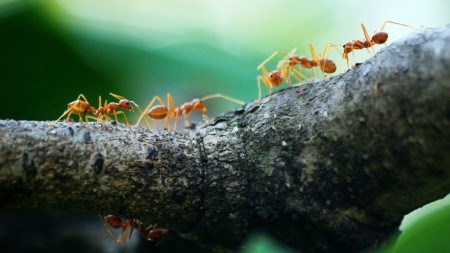From roaches in hotels to rats in the garage, all of us have at some point had run ins (or crawl ins) with pests. Often the poisons, pesticides and treatments we use to keep mice out the garage and bugs off the plants are toxic and do more damage than good. Predators such as owls may die as a result of eating rats that have been poisoned. Children or pets become gravely ill from accidentally ingesting poisons meant for pests. Below are a few alternatives to the toxins that most of us don't hesitate to use.
Ants
The most common pest homeowners’ face is ants. Though they may not carry disease, given a chance they will carry off entire sugar bowls or any leftover food not sealed in airtight containers. Rather than using fowl smelling aerosol poisons try the following:
• Spray the ants with a bit of soapy water.
• Ants have an aversion to bitter cucumber. Leave bits or slices near the ants point of entry
• Dry, crushed mint leaves or cloves also work as ant deterrents.
• A change in light can discourage their foraging patterns. Leave a small, low wattage light on.
Cockroaches
The best defence against cockroaches is cleanliness but should you be plagued by persistent bugs try:
• Catnip. Nepetalactone, the active ingredient, repels cockroaches. You can simmer it in water to make a tea that you can then spray behind counters. Say goodbye to roaches (but hello to cats!).
• Soak a few slices of bread in beer, place them in a jar, cover the inside lip in Vaseline and leave the jars in infested areas. Roaches will be attracted to the scent of beer (like rugby fans) but once in the jar will be unable to escape.
Flies
Summer brings with it flies. Keep these critters out by doing the following:
• Mint is not only great for cocktails, but if crushed and left around the home it can repel flies.
• Flies are attracted to pet food. Leave containers of sweet basil and clover near pet bowls.
• Add eucalyptus oil to an old absorbent cloth and hang in infested areas.
Rats and mice
When it comes to rats and mice, prevention works best. Ensure that your compost bins are sealed, secure food sources or materials that can be used to make nests and ensure that your home, garage or shed is clean. You can use repellents such rags or cotton balls soaked in peppermint oil. Try mixing flour and cement powder and setting this aside with a bowl of water. The mixture will set and harden once the rat has ingested it. Though somewhat cruel, should a rat that has eaten this mixture be caught by a family pet or owl, the predator won’t die as a result of poisoning.
To keep your organic veggie garden free of pests try:
• Seaweed mulch contains trace elements such as iron, zinc, barium, calcium, sulphur and magnesium, which promote healthy development in plants while repelling slugs.
• Get rid of mites and aphids by mixing canola oil, a few drops of soap and water. Put this mixture in a spray bottle and spray the plant. The oily mixture smothers insects.
• Fungal plant diseases can be treated with a mixture of baking soda and water. Spray the mixture on infected plants every few days until the fungus disappears.
• Diatomaceous earth, which contains fossilised remains of algae, can be used to treat or repel slugs, cockroaches, fleas and bedbugs.
The Web is filled with resources on non-toxic pest control methods but also Urban Legends (such as fizzy soft drinks being used to kill rats because of their inability to burp). Try the following sites to start:
http://www.ecologycenter.org/factsheets/rodent_control.html




